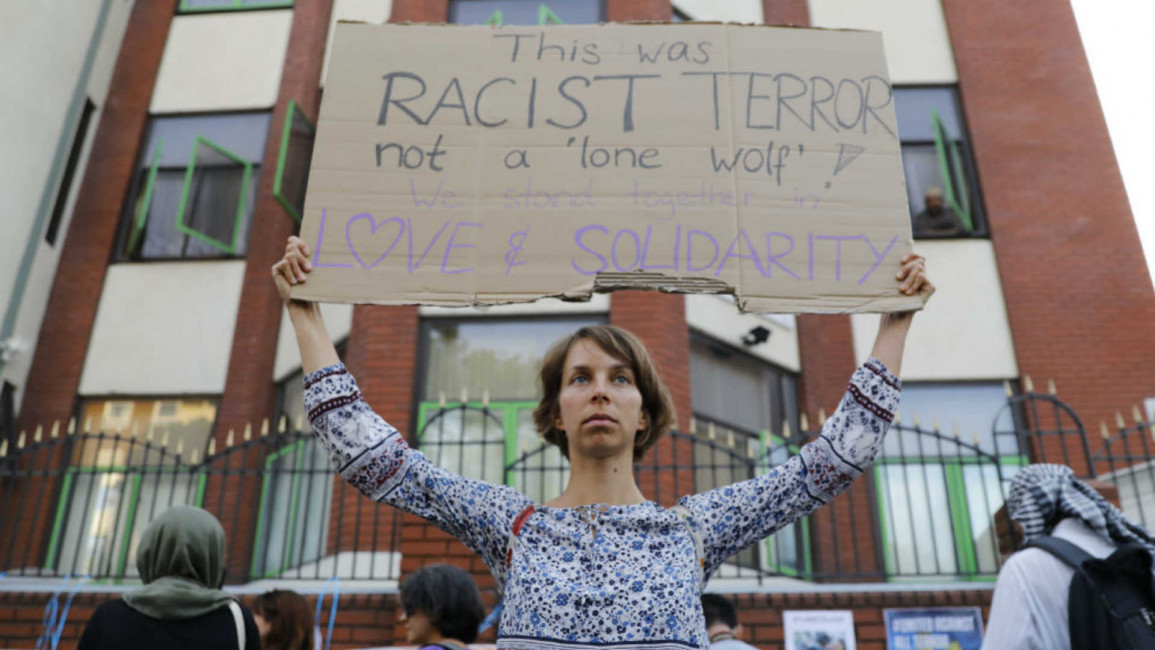
Finsbury Park attack: Radicalisation isn't exclusive to Islam
There has been yet another terrorist attack in London.
It's only through sheer luck that it wasn't an act of mass murder, with a radical Islamophobic terrorist ploughing his white van into a large crowd of Muslims outside the Muslim Welfare House in London's Finsbury Park. They had just finished evening prayers after iftar in the holy month of Ramadan.
One man, already stricken by a suspected heart attack, died as the terrorist ploughed his vehicle into the helpless people, while nine others were taken to hospital.
If we were to switch things around and imagine it was a Muslim who deliberately drove a vehicle into pedestrians, as occurred earlier this year, round about now is the time the British media and political class would be pouring over the concept of "radicalisation".
At its most crude expression, it takes the form of that old war on terror deliberation of "why do they hate us", with the "they" meaning Muslims and the "us" meaning everyone else.
So, let's ask why Darren Osborne hated Muslims so much as to want to, in his own words, "kill all Muslims", which is what he shouted as he drove his van into the crowd, with murderous intent?
If we take seriously the concept of "radicalisation" - the idea that hitherto "normal" people can be transformed into murderers through being exposed to ideology that requires or engenders such murder, which the British government certainly does when it comes to so-called Islamic terrorism, then perhaps we must ask how Osborne became "radical" enough to try to carry out mass murder against Muslims?
With so-called Islamic terrorism, the process of radicalisation is often conceived as being something inherent to the Islamic faith itself. As if the murder of innocent people at a pop concert is sanctioned within the pages of the Quran itself.
 |
It must surely be time to take an equal approach to terror against Muslims by Islamophobes |  |
Or the inference is that there exists figures and material that aids in this process of radicalisation - the idea, supported by Theresa May with some vehemence, that hate preachers and extremist propaganda found on the internet is the key to radicalisation.
If people believe, with some good reason, that the extremely marginal subculture of Salafi-jihadism, which is often as alien to most Muslims as it is to non-Muslims, plays a role in motivating young men and women towards mass murder and extreme acts of violence, then what is the cultural aspect of the radicalisation of Islamophobic terror? Why do they hate Muslims?
Twitter Post
|
Of course, one must be nuanced about this kind of phenomenon.
There is no single, essential motivation for the crime of mass murder, but hardly anyone would deny that it's a mixture of direct ideological motivations (such as, in the case of so-called Islamic terrorism, the ideology of the Islamic state group), social circumstances and the specific personal and psychological traits of the offender.
But, given so much time and resources are spent by the media and the state on the ideological or cultural aspect of radicalisation when it comes to so-called Islamic terror, it must surely be time to take an equal approach to terror against Muslims by Islamophobes.
I, as well as many others, have written repeatedly on the fact that Islamophobia has become normalised within British culture, particularly through the vessel of the dominant right-wing news media.
Some of us remember the testimony of the former Daily Star journalist Richard Peppiatt to the Leveson Inquiry, where he detailed how he quit the newspaper due to its open editorial support for the fascist, violently Islamophobic English Defence League and its deliberate cultivation of Islamophobia through what would now be called "fake news", designed to whip up an Islamophobic frenzy among its millions of readers.
| Read more: Selective compassion: London Bridge, Manchester and Kabul reveal western media bias | |
We all witnessed how Islamophobia was appealed to by the Leave campaign during the EU referendum last year, coinciding with the Islamophobic fascist Tommy Mair assassinating the proudly pro-Muslim immigration politician Jo Cox.
Of course, these are just examples of what has been a consistent part of the culture of the UK since 9/11, with the media consistently portraying Muslims in a negative light, with the political class often following suit with this demonology.
At best Muslims have been consistently depicted by the right-wing media, or even referred to as such in political speeches by prime ministers, as aliens in desperate need of "assimilation" to alleged "British values", or at worst violent extremists and terroristic enemies within.
 |
The process of radicalisation is often conceived as being something inherent to the Islamic faith itself, as if the murder of innocent people at a pop concert is sanctioned within the pages of the Quran itself |  |
The call is always for the "Muslim community" to "do more" to "root out" extremism, even though the Manchester suicide bomber Salman Abedi had been reported to authorities by Muslims no fewer than five times, to no avail.
Following the attack in Finsbury Park, much of the British media was quick to highlight the fact that the notorious "hate preacher" and al-Qaeda supporter Abu Hamza had preached round the corner at Finsbury Park mosque.
The Times remarked how the mosque had "worked hard to escape the shadow of Abu Hamza", while The Independent noted that the mosque had formerly been an ‘Al-Qaeda guesthouse’. The Telegraph had it down as a former "radical hotbed". The Mail’s original leading headline regarding the attack referred to the incident not as any kind of terrorist attack, but rather a "white van driver ploughing into a crowd outside… Finsbury Park mosque where hate cleric Abu Hamza once preached".
Doesn't this tell us something about how the popular consciousness of Islam is conditioned in the post-9/11 era?
| Read more: Why this Muslim is waiting for a white apology march after Finsbury Park attack | |
The obsession has always been with the extremes – with the hook-handed, eyepatch-wearing evil doers, almost pantomime-esque in their media friendly villainy, but never with nuance.
Immediately the press highlighted the mosque's former "association" with Abu Hamza - it's not a huge leap then when former EDL leader and far-right Islamophobe Tommy Robinson directly blamed the victims of the attack claiming that the mosque was responsible for "creating terrorists" and indicating that Osborne's assault was a presumably justified response to that.
The fact that the victims had nothing to do with Abu Hamza or his own brand of Salafi-jihadism should not have to be stated, but the media were apparently compelled to bring it up.
While Islamophobia in the UK - in its most direct forms, such as verbal or physical abuse or overt discrimination - is of course outlawed, it remains unregulated and accepted in its subtler forms.
 |
British society, in terms of how it relates to Islam, is itself riddled with extremism |  |
Why has Tommy Robinson and his former organisation, the EDL, which quite literally attempted to carry out pogrom-like demonstrations in Muslim communities, not been outlawed?
Why in the UK, with all its complex hate crime and terror legislation, are groups like "Britain First", which organises mosque invasions, not proscribed in the same way that rhetorically extreme Islamic groups like Al-Muhajiroun have been?
After the attack, Theresa May rightfully said that "terrorism, extremism and hatred take many forms and our determination to tackle them must be the same, whoever is responsible," adding that "there has been far too much tolerance of extremism in our country over many years - and that means extremism of any kind, including Islamophobia".
These are welcome words, but they mean very little when we live in a society that tolerates and seems to morbidly venerate people such as the Daily Mail’s Katie Hopkins, who, following the Manchester attack, called for a "final solution" to the Muslim "problem".
This gets to the heart of the issue - while "radicalisation" is often imperfect in terms of understanding acts of "terrorism", if we can all agree that information plays a part in inspiring violent acts, the problem with Islamophobia is that it is now something deeply rooted in British society. British society, in terms of how it relates to Islam, is itself riddled with extremism.
Nobody wants censorship, but a true fightback against the kind of Islamophobia, intertwined as it often is with anti-immigrant narratives also beloved of the British media, that claimed the life of Jo Cox or that inspired Darren Osborne to plough his van into Muslims in London, must begin with a period of self-awareness among the British political class.
It can no longer be tolerated in the media and appealed to by cynical politicians to whip up exploitable hatred.
When it comes to depictions of Islam and Muslims, British society itself needs to be de-toxified.
Sam Hamad is an independent Scottish-Egyptian activist and writer.
Opinions expressed in this article remain those of the author and do not necessarily represent those of The New Arab, its editorial board or staff.




